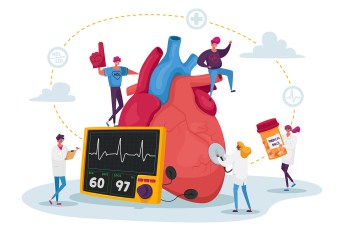Fifteen minutes of exercise a day can help prevent heart disease. This can be as simple as taking a walk, riding a bike, swimming, or even some strength training or stretching while you are watching TV.
Not only does exercise help you maintain a healthy weight and lower your blood pressure, but it also helps you reduce stress and improve your mental health.
Heart disease in women Veterans
Heart disease is the leading cause of death among all adults in the U.S. Traditional risk factors for heart disease include high blood pressure, high cholesterol, diabetes, obesity and smoking. However, mental health conditions like posttraumatic stress disorder (PTSD) and depression, which are common in women Veterans, can also increase heart disease risk.
Be sure to work with your primary care team to discuss your risk factors for heart disease, especially when coping with stress, PTSD or trauma.
Women Veterans are more racially and ethnically diverse than non-Veteran women. This is another reason heart disease is more prominent in women Veterans. Black or non-Hispanic African American women experience higher rates of heart disease and related risk factors, such as diabetes, obesity, smoking and high blood pressure than white and Hispanic women Veterans.
Your primary care team can discuss your risks with you, and together, you can make a heart healthy plan for your life.
Risk factors for heart disease
A number of factors can increase your chance of getting heart disease:
- Smoking (women have an even greater risk for heart disease if they smoke compared to men)
- Being overweight
- A sedentary lifestyle (not moving enough throughout the day)
- High blood pressure
- Too much stress in your life
- History of preeclampsia (high blood pressure) or diabetes while pregnant
- Having PTSD, depression or experiences of trauma
- Having sleep apnea and/or not getting good sleep
What’s the good news?
Fortunately, many of these risk factors can be addressed with lifestyle change—things you can do at home. You can reduce your chance of heart disease and improve your heart health by eating more vegetables and less sugar, getting enough sleep, taking your prescribed medicines as directed, and exercising at least 15 minutes a day.
Exercising can be as simple as going for a brisk walk in your neighborhood.
Risk factors for heart disease include inactivity and being overweight.
Eating green leafy vegetables such as spinach, kale and collards is very healthy for your heart. In fact, people who regularly eat green leafy vegetables can prevent heart attacks and significantly reduce their chance of heart disease. If you don’t like these vegetables, try mixing them up into a smoothie with some fruit.
If you smoke, work on quitting
Because of the effect it has on your heart, smoking throughout your life can shave 13-14 years from it. But it is not too late to quit. When you stop smoking, your risk for heart disease can be cut in half just one year later and continues to decline until it’s as low as a nonsmoker’s risk.
VA understands your unique health needs and has resources to help you.
- Whole Health approaches like yoga, tai chi, mindfulness or meditation can benefit your physical and heart health and can help reduce stress.
- How to quit offers several resources for quitting tobacco.
- VA Mindfulness Coach App: Mindfulness has been shown to reduce stress, an important risk factor for heart disease.
- MOVE! Weight Management Program: The MOVE! Weight Management Program encourages and offers resources for healthy eating behaviors, physical activity and exercise, and weight loss.
- She Wears the Boots: Heart Health: This podcast episode details facts and myths about heart health among women Veterans and provides tips on how to take steps to improve your heart health.
- VA News: Whole Health Series: This Live Whole Health series details practices that can improve both physical and mental health.
- Healthy Teaching Kitchen: Heart Health: This video includes heart healthy tips and recipes and outlines which foods are best for your heart.
Don’t skip a beat on your heart health
Commit to 15 minutes of exercise each day. And see your provider to check for high blood pressure, diabetes, or high cholesterol, all of which can affect your heart. Remember to talk with your provider about your specific risk factors and make a heart health plan.
If you don’t already use VA health care, you can also use the following online tools:
- Find out if you are eligible for VA health care.
- Enroll in VA health care if you haven’t already.
- Find your local VA to learn about what services may be available and to make an appointment.
If you have questions about VA health care services for women Veterans, or don’t know where to start, you can call, text or chat online with our Women Veterans Call Center at 855-829-6636.
Topics in this story
Link Disclaimer
This page includes links to other websites outside our control and jurisdiction. VA is not responsible for the privacy practices or the content of non-VA Web sites. We encourage you to review the privacy policy or terms and conditions of those sites to fully understand what information is collected and how it is used.
More Stories
Bob Jesse Award celebrates the achievements of a VA employee and a team or department that exemplifies innovative practices within VA.
This month's Center for Women Veterans Book Corner author is Navy Veteran Kimberly Henry, who served as a Cryptologic Technician and Sexual Assault Victim Advocate from 2009-2019. She created "Warrior's Path to Healing: A 12-Week Empowerment Journal for Women Veterans."
The Medical Foster Home program offers Veterans an alternative to nursing homes.








To who read this does everyone of this Veteran Medical Centers Providers tell their patients don’t skip a beat on your heart ♥ health